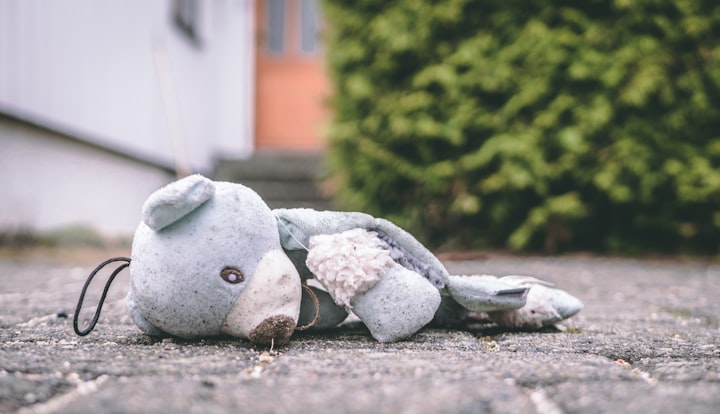Not All Adventures Are Fun
Some are even terrible

It was 5:00 am when we hit the trailhead of one of the most challenging day-hikes the Wasatch mountains have to offer. For August, it was a cool morning, but I knew that would change as soon as the sun crept over the jagged peak above us.
We hiked quickly, reaching the peak in about 6 hours. The temperature had already reached 95°F (35°C).
On the way up, I started not feeling well; a dull ache in my stomach. The trail at the top is not well defined and without the landmark of the peak to guide us, we got lost coming down.
The ache turned into nausea, and a bit of panic that it was taking us so long to find the trail.
After about an hour of wandering, the trail presented itself.
Much of the last few miles of the hike are on a west-facing slope that is completely exposed with very little vegetation with a large boulder adorning the trail just at at the point where any semblance of shade disappears.
I suppose it was around 2:00 pm when we stopped in the shade of that boulder to rest. I was in trouble but didn’t want to cause any alarm in my young hiking companion.
After a few moments, we started down the trail but only made it perhaps a hundred yards before I had to rest again. One hundred yards at a time turned into fifty, turned into twenty-five.
That’s when I collapsed.
The parking lot was close enough that I could see my car.
In my mind, I wondered why I couldn’t make my muscles move.
When I fell, I was next to a low hedge that provided some relief from the sun. I was on my side and vomited in the dirt inches from my face. I had fallen near a formicary of red ants. I could feel them crawling on my legs, biting me, but I couldn’t do anything about it.
Understandably panicked, my young companion called emergency services. (I’ve never been so grateful we were in a place we could get good reception.)
It took more than three hours for rescue workers to reach our location because — and I’m not making this up — the hillside between us and the parking lot caught fire which forced the rescuers to take a very long route to reach us.
By the time they reached us, I was in and out of consciousness. They immediately stuck needles in both my arms to administer IV fluids. I don’t know if I was dreaming but it seemed like one of the EMTs squeezed the bag of fluids to get them in me as fast as possible.
Because of the steepness of the trail where I collapsed attempts to carry me on a stretcher failed. The three responders made the decision to carry me, piggyback style, from where I had collapsed to a point just over a mile away where a medevac helicopter waited.
A short, very expensive helicopter ride later, I found myself laying in a hospital bed with my wife standing by my side, IVs still hooked up to both my arms.
Spoiler alert: I survived.
· · · · · · · ·
For several years after that experience, I categorized it as traumatic. I was in the best physical shape of my life, but an extreme loss of electrolytes due to sweat and improper hydration nearly cost me my life.
I learned a valuable lesson: when I’m physically active, I sweat a lot, and my electrolytes get out of whack quickly. So, I go prepared. I never engage in strenuous physical activity without plenty of water and electrolytes to keep me out of trouble.
As the years have gone by, and I’ve dealt with that trauma, it has gone from being traumatic to interesting to an adventure; not a fun one, but something hyper-memorable that informs my behavior and that of my family members when when recreate outdoors, especially in the summer.
There are events, particularly those that lead to the traumatic loss of life, that may be impossible to transition from trauma to adventure.
While the experience can be the adventure, for those experience we might otherwise want to forget, the adventure is in what we learn from the experience.
Bogdan Cojocaru said:
Sometimes, what life serves us may not be the experience we want, but the experience we need, in order to progress.
I like that statement with one qualifier: nobody gets to decide for you whether you needed a particular experience. How we respond to what happens in our lives is a deeply intimate choice (conscious or otherwise). In part, we learn to respond to things based on cultural norms (some of which aren’t very healthy) and our own nature. For example, no one has to teach a child to cry when they feel pain, but there are other responses to pain that are learned behaviors.
To borrow a quote from Helen Keller, “Life is either a daring adventure or nothing at all.”
Life is short. It’s an adventure, even when it’s miserable. There’s potential to learn something from the mundane to the tragic to the remarkable.
The question is: what will I learn?
· · · · · · · ·
Thanks for reading!
About the Creator
Aaron Pace
Married to my best friend. Father to five exuberant children. Fledgling entrepreneur. Writer. Software developer. Inventory management expert.






Comments
There are no comments for this story
Be the first to respond and start the conversation.